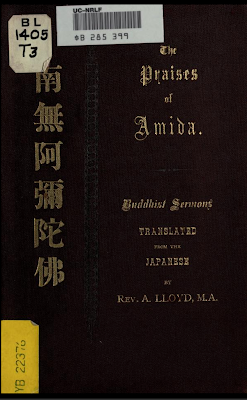Joseph Estlin Carpenter’s 1909 review of Tada Kanai’s “The Praises of Amida”
The contrast between different ways of dealing with sin in modern Shinto ritual and Buddhist preaching receives remarkable illustration in the sermons of Tada Kanai, of the Shin Shu Sect (the True Sect of the Pure Land), translated with admirable sympathy by the Rev. Arthur Lloyd under the title “The Praises of Amida.” The characteristic features of this sect were described in this Journal by Mr Troup (Jan. 1906) ; it is only necessary to recall the conception on which its teaching is founded, that faith in the Buddha of Infinite Light and Life is the sole requisite for the believer’s salvation. In these sermons the preacher avails himself of all the resources of literature, ancient and modern, to awaken the careless to a sense of their danger, to strengthen the wavering, to comfort the troubled. Passages from the sacred texts, from Epictetus or Emerson, sayings from the Gospels, incidents from the romances of Hugo, Hawthorne, or Tolstoi, show that the Buddhist teacher is confronted with the same moral problems as the men of insight in all ages. How to find the gate of true peace, what is the tender mercy of Amida in calling us to him out of the storms of evil into a safe refuge, how even “our sin only serves to bring out more clearly the workings of the Divine Mercy,” how there is only One Rule, One Law, One Buddha, and One Paradise, how all men must be bound into union by means of the One Name and the Great Parent awaits their coming to him, how we must all prepare to go forth from the hostelry of this life and turn our faces to the City of Light — these are the preacher’s themes. It will be to the lasting shame of Christian sectarianism if the Buddhism that expresses itself thus remains estranged from the character and the message of Jesus Christ.
J. E. Carpenter
Manchester College, Oxford
Hibbert Journal, 7:700 (1909)
J. E. Carpenter
Manchester College, Oxford
Hibbert Journal, 7:700 (1909)



Comments